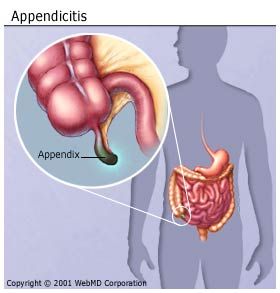Appendicitis
Definition
The appendix is a narrow, finger-shaped pouch that projects out from the colon. Appendicitis occurs when the appendix becomes inflamed and filled with pus.
AppendicitisAppendicitis is a condition in which your appendix becomes inflamed and fills with pus. Your appendix is a finger-shaped pouch that projects out from your colon on the lower right side of your abdomen. This small structure has no known essential purpose, but that doesn't mean it can't cause problems. Appendicitis causes pain that typically begins around your navel and then shifts to your lower right abdomen. Appendicitis pain typically increases over a period of 12 to 18 hours and eventually becomes very severe. Appendicitis can affect anyone, but it most often occurs in people between the ages of 10 and 30. The standard appendicitis treatment is surgical removal of the appendix.
Symptoms
Signs and symptoms of appendicitis may include:
The location of your pain may vary, depending on your age and the position of your appendix. Young children or pregnant women, especially, may have appendicitis pain in different places. When to see a doctor Make an appointment with a doctor if you or your child experiences signs or symptoms that worry you. Abdominal pain so severe that you are unable to sit still or find a comfortable position requires immediate medical attention. The cause of appendicitis isn't always clear. Sometimes appendicitis can occur as a result of:
In both cases, bacteria inside the appendix multiply rapidly, causing the appendix to become inflamed, swollen and filled with pus. If not treated promptly, the appendix can rupture. Complications
Appendicitis can cause serious complications, such as:
|
